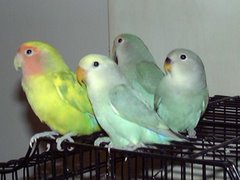 Most of the lovebirds owners know that lovebirds are so keen on chewing something. Yes!!! Chewing is a normal behavior of a lovebird. Lovebirds like to chew because it not only feels fun and good for them, but also help them to maintain their beak properly.
Most of the lovebirds owners know that lovebirds are so keen on chewing something. Yes!!! Chewing is a normal behavior of a lovebird. Lovebirds like to chew because it not only feels fun and good for them, but also help them to maintain their beak properly.
If you see uncontrollable chewing, then proper lovebird care should be ensured. Sometimes, if you allow the lovebird to move freely in your home, it will start chewing your personal items including furniture, clothing, or toys. If they tend to chew each and everything, it would be really dangerous because they will try to chew on, anything from toxic materials to live wire.
How To Prevent Lovebird Chewing?
You cannot watch your lovebird all the time through out the day. The best remedy is to remove all the tempting items out of range. Provide plenty of access to things he can peck on.
There are few toys available in the market to prevent bird chewing. Cosmic crunch toy is the most preferred one. You can get this from your local store. If not, browse the net to find suitable one. Some of the toys contain bird safe beads, blocks, rope, and exercise material for the lovebirds beak.
Some of the lovebird owners prefer to go for natural methods to prevent bird chewing. They will offer treats o their lovebirds viz., uncooked pasta or shell. You can buy the treat cage with toys and The Jungle Joy treats from local stores also.
Hope you'll prevent the lovebirds chewing activity by following the discussed simple lovebirds care above. ALL THE BEST!!!






